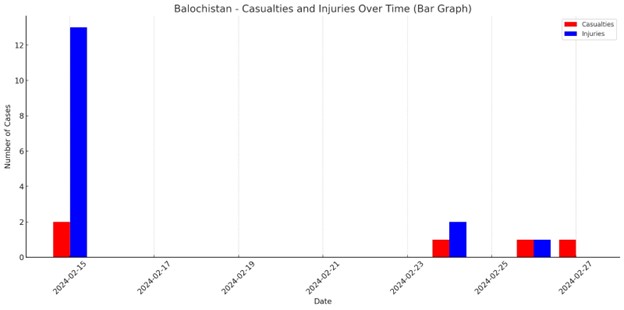TSB Report
A group of terrorists carried out two suicide bombings to breach a military base wall in Bannu, Khyber Pakhtunkhwa, followed by an armed assault that left at least 13 civilians dead and 32 injured. The security forces reacted timely and killed 16 assailants. A militant groups, Jaish Al-Fursan, affiliated with Hafiz Gul Bahadar, linked to the Tehreek e Taliban Pakistan (TTP) claimed responsibility. The explosions, occurring during Ramadan, resulted in the deaths of four children living nearby. After the initial blasts, five to six attackers attempted to enter the base but were neutralized. The said militant groups, responsible for multiple past attacks in the region, claimed the assault involved explosive-laden vehicles. This marks the third major militant strike since Ramadan began, highlighting escalating security threats in Pakistan’s northwest.
Bannu is in the eye of storm. This is the third attack on Bannu military base in less than a year. Last November, a suicide car bomb killed 12 personnel and wounded several others at a security post. In July, a suicide bomber detonated his explosives-laden vehicle and other militants opened fire near the outer wall of the military facility. It reflects a persistent and evolving militant threat in Khyber Pakhtunkhwa, a historically volatile region. It also suggests a clear lack of effective intelligence work.
The use of suicide bombers to breach fortified areas, followed by direct armed engagement, suggests a well-coordinated strategy aimed at destabilizing security forces. The choice of timing—during Ramadan—indicates a psychological and strategic attempt to exploit moments of religious observance for maximum impact. The repeated targeting of Bannu highlights its significance in Pakistan’s counterterrorism efforts, as seen in past attacks on military and security posts. The involvement of Jaish Al-Fursan signals the resurgence of militant factions using vehicle-borne explosives, an increasingly common tactic.
The TTP and BLA strategy to attack security forces is not a secret. There have been persistent attacks on the security forces during the last two years. With effective intelligence and penetration in the groups this could have been foiled. There are reports of lackadaisical response to threat alerts. An inquiry should be conducted in this incident to find out the faults and follies that led to this incident.
These attacks not only pose immediate security challenges but also raise concerns over the long-term stability of the region, necessitating stronger counterterrorism measures and intelligence operations to preempt such threats.
ISPR has stated that as per intelligence reports Afghan nationals, surely Afghan Taliban, were involved in it and the evidence is available that the planning and instructions were given by the militant leaders based in Afghanistan.
Recommendations to Counter Terrorist Attacks on Bannu:
- Coordinated combing operation should be unleashed to track down the terrorists, facilitators, financers and sympathisers. Police and FC should be at the fore front to rummage through the area.
- Disrupt Militant Financing and Logistics
- Crack down on illegal funding sources, including smuggling and extortion networks.
- Enforce stricter border control to prevent arms smuggling.
- Community Engagement & De-Radicalization
- Locals should be won over to support and help the security and intelligence agencies.
- Launch awareness campaigns to educate local communities about extremism threats.
- Strengthen religious and educational institutions to counter radical narratives.
- Provide economic and social support programs to reduce militant recruitment.
- Strengthen Intelligence and Surveillance
- Enhance intelligence-sharing between military, police, and civilian agencies.
- Deploy AI-powered surveillance and data analytics to detect suspicious activities.
- Increase monitoring of extremist groups’ online communications and recruitment channels.
- Penetration in these groups is absolutely essential.
- Improve Perimeter Security at Military Installations
- Reinforce walls and install advanced detection systems (motion sensors, thermal cameras).
- Implement multi-layered security checkpoints to prevent suicide bombers from reaching targets.
- Conduct frequent security audits and drills to identify and address vulnerabilities.
- Enhance Cybersecurity and Digital Monitoring
- Monitor extremist propaganda and recruitment activities on social media.
- Increase cybersecurity capabilities to prevent terrorist coordination through digital platforms.
- Work with tech companies to remove extremist content and track communications.
- Strengthen Ramadan and Public Gathering Security
- Increase police and security presence during Ramadan and other religious events.
- Set up security checkpoints near mosques and public gathering spots.
- Deploy undercover security personnel to identify potential threats.
- Legal and Policy Reforms
- Strengthen anti-terror laws to enable faster prosecution of militants.
- Ensure swift and transparent trials for captured terrorists.
- Expand rehabilitation programs for surrendered militants to prevent re-radicalization
- Volunteers and Private Security
- Serious and sustained efforts should be made to recruit volunteers from the area and elsewhere to support the LEAs and intelligence agencies.
- Private security agencies should be used to share the responsibilities in some areas, reducing the burden on the security forces.

